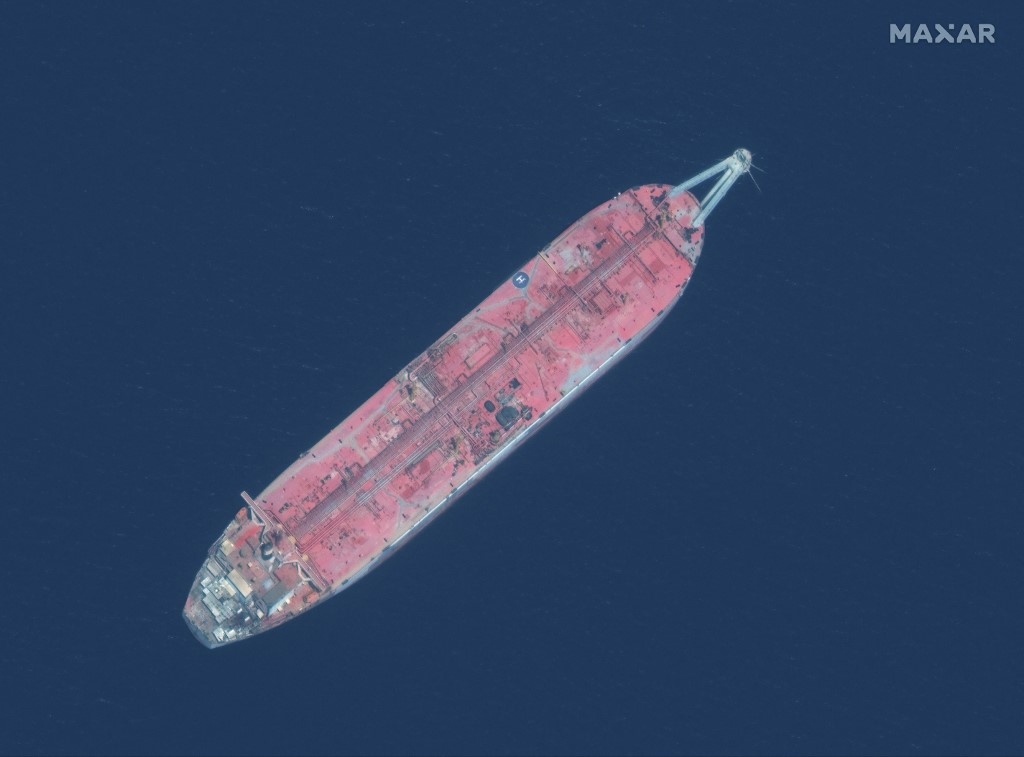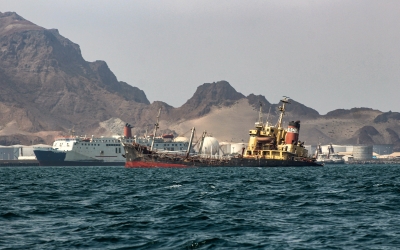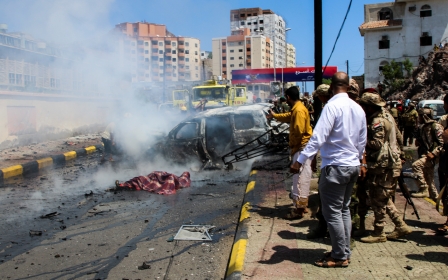Yemen: Decaying oil tanker in Red Sea threatens millions

A potential oil spill from a decaying tanker moored off the coast of Yemen could disrupt food and water supplies for millions of people in the war-torn country, and cause an environmental and public health catastrophe that would be felt across the region, researchers have warned.
In a paper published in the Nature Sustainability journal on Monday, researchers from Stanford University, Harvard University, and UC Berkeley said an oil spill stemming from the FSO Safer tanker would impact the clean water supply of nine million people, and disrupt the food supply of between five and eight million people.
New MEE newsletter: Jerusalem Dispatch
Sign up to get the latest insights and analysis on Israel-Palestine, alongside Turkey Unpacked and other MEE newsletters
"The public health impacts of a spill from the oil tanker Safer are expected to be catastrophic, particularly for Yemen," the study said.
The researchers called for urgent action to be taken in order to move the oil out of the tanker, adding that the "potentially disastrous impacts remain entirely preventable".
Nearly 70 percent of humanitarian aid to Yemen enters through the ports of Hodeidah and Salif, which are near the stricken Safer, and more than half of Yemen’s population depends on humanitarian aid.
"The expected humanitarian impact of the spill is staggering," Benjamin Huynh, one of the authors of the paper and a researcher at Stanford University, told Middle East Eye.
'Guaranteed to spill without intervention'
The Safer oil tanker was constructed in 1976 and has been anchored 60km north of Yemen's port city of Hodeidah since 1988, acting as an FSO terminal to receive Yemeni export crude and load it onto vessels.
Safer has not been in use since the Houthis took control of Hodeidah in 2015, but it is estimated to hold 1.1 million barrels of oil. Because of its age, a lack of maintenance, and the breakdown of the crude inside, it has led to a growing risk of a chemical explosion.
'The oil needs to be offloaded from the Safer'
- Benjamin Huynh, Stanford University
The amount of oil in the tanker amounts to four times the amount of oil spilt in the world's most environmentally damaging oil spill, the 1989 Exxon Valdez disaster.
An engine room leak in May 2020 served as a wake-up call, with the United Nations saying a temporary fix had succeeded in containing the leak. The fix, however, is unlikely to hold for long and a spill could occur at any time.
"Experts familiar with the situation say the spill is eventually guaranteed to happen in the absence of intervention, but nobody knows when the spill will occur," Huynh said.
"The oil needs to be offloaded from the Safer. The best-case scenario would be to halt the ongoing conflict and blockade, allowing negotiations over the Safer to go more smoothly. Failing that, finding another way to offload the oil or repair the vessel should be a top priority."
'Mass preventable deaths'
The area of the Red Sea that would be affected by an oil spill from the tanker is home to multiple Yemeni ports, as well as several desalination plants and fisheries that provide an income to millions of Yemenis.
In addition to the coastal damage, the researchers noted that there was a potential for air pollution to reach central and northern areas of Yemen, increasing the number of hospitalisations from cardiovascular issues to anywhere from 5.8 to 42 percent. It would also disrupt supplies in a country that imports nearly all its food and oil.
"With nearly 10 million losing access to clean water and seven million losing access to food supplies, we'd expect mass preventable deaths through starvation, dehydration, and water-borne illness," said Huynh.
"This is further compounded by the expected fuel and medical supplies shortage, potentially inducing widespread hospital shutdowns. Finally, we expect air pollution to significantly increase the risk of hospitalisation for cardiovascular and pulmonary outcomes."
In June, the UN Security Council accused the Houthi group of delaying a technical assessment of the tanker. Internal documents obtained by the Associated Press revealed that seawater had entered the engine compartment of the tanker in June 2020, causing damage to the pipelines and increasing the risk of sinking.
The AP said, citing experts, that maintenance was no longer possible because the damage to the ship is irreversible.
The Houthis, however, blamed the UN for a collapse in the talks surrounding the Safer oil tanker and claimed the international body ruled out most of the agreed maintenance over a lack of funding.
Middle East Eye delivers independent and unrivalled coverage and analysis of the Middle East, North Africa and beyond. To learn more about republishing this content and the associated fees, please fill out this form. More about MEE can be found here.





